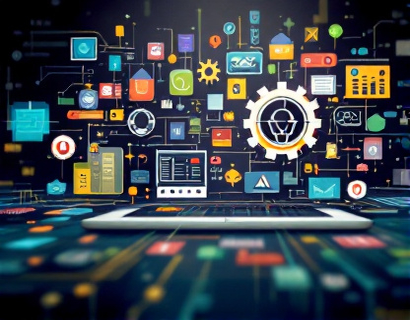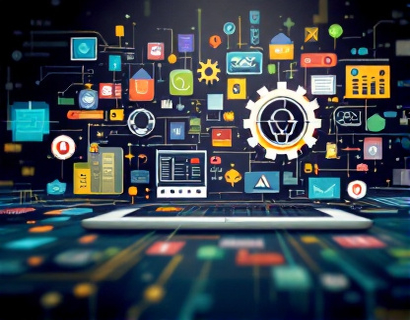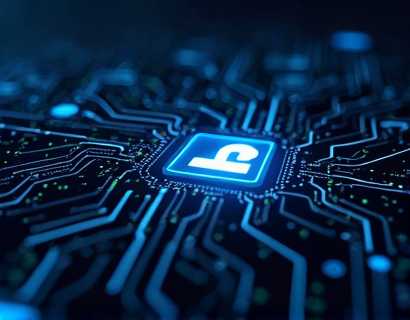Seamless AI and Blockchain Integration: Essential Guide for Business Digital Transformation
In today's rapidly evolving digital landscape, businesses are increasingly turning to advanced technologies to enhance their operations and drive growth. Among these technologies, Artificial Intelligence (AI) and Blockchain stand out as transformative forces that can redefine how organizations operate. This guide serves as an essential resource for business leaders looking to integrate AI and blockchain into their operations, providing actionable strategies to streamline processes, enhance security, and unlock new growth opportunities in their digital transformation journey.
Understanding AI and Blockchain
Before diving into the integration strategies, it is crucial to understand what AI and blockchain are and how they can benefit businesses. AI refers to the simulation of human intelligence in machines that are programmed to think and learn. It encompasses various technologies, including machine learning, natural language processing, and computer vision. On the other hand, blockchain is a decentralized digital ledger that records transactions across multiple computers in a way that ensures the security and transparency of data.
The combination of AI and blockchain can lead to significant improvements in efficiency, security, and decision-making processes. AI can analyze vast amounts of data stored on a blockchain, providing insights that can drive strategic decisions. Meanwhile, blockchain can enhance the security of AI systems by ensuring data integrity and preventing unauthorized access.
Benefits of Integrating AI and Blockchain
Integrating AI and blockchain offers numerous benefits for businesses, including:
- Enhanced Security: Blockchain's decentralized nature provides a secure environment for AI systems, protecting sensitive data from breaches and unauthorized access.
- Improved Efficiency: AI can automate processes and analyze data in real-time, while blockchain can streamline transactions and reduce the need for intermediaries.
- Data Integrity: The immutable nature of blockchain ensures that data used by AI systems is accurate and trustworthy, leading to better decision-making.
- Cost Reduction: By automating tasks and reducing the need for manual intervention, businesses can lower operational costs and improve profitability.
- New Revenue Streams: The integration of AI and blockchain can lead to innovative business models and services, opening up new growth opportunities.
Actionable Strategies for Integration
To successfully integrate AI and blockchain into your business, consider the following actionable strategies:
1. Assess Your Business Needs
Before implementing any technology, it is essential to assess your business needs and identify areas where AI and blockchain can add value. Conduct a thorough analysis of your current operations, challenges, and goals. This assessment will help you determine the specific use cases for AI and blockchain integration.
2. Start with Pilot Projects
Once you have identified potential use cases, start with pilot projects to test the integration of AI and blockchain. These projects should be small-scale and focused on specific objectives. By starting small, you can evaluate the effectiveness of the integration and make necessary adjustments before scaling up.
3. Collaborate with Experts
Integrating AI and blockchain can be complex, and collaborating with experts in these fields can provide valuable insights and guidance. Consider partnering with technology providers, consultants, or academic institutions that specialize in AI and blockchain. Their expertise can help you navigate the challenges of integration and ensure a successful implementation.
4. Focus on Data Management
Data is at the core of both AI and blockchain technologies. Establish a robust data management strategy that ensures data quality, security, and accessibility. This strategy should include data governance policies, data storage solutions, and protocols for data sharing between AI and blockchain systems.
5. Ensure Compliance and Security
As you integrate AI and blockchain, it is crucial to ensure compliance with relevant regulations and standards. This includes data protection laws, industry-specific regulations, and cybersecurity best practices. Implement security measures to protect sensitive data and maintain the integrity of your AI and blockchain systems.
6. Foster a Culture of Innovation
Encouraging a culture of innovation within your organization is essential for successful digital transformation. Promote collaboration, experimentation, and continuous learning among your teams. Provide training and resources to help employees understand AI and blockchain technologies and their potential impact on the business.
7. Measure and Optimize
After implementing AI and blockchain integration, it is important to measure the outcomes and optimize your strategies. Establish key performance indicators (KPIs) to evaluate the success of your integration efforts. Use data analytics to gain insights into performance and identify areas for improvement.
Use Cases of AI and Blockchain Integration
To illustrate the potential of AI and blockchain integration, here are some compelling use cases across various industries:
1. Supply Chain Management
In supply chain management, AI can analyze data from various sources to optimize inventory levels, predict demand, and improve logistics. Blockchain can enhance transparency and traceability by providing a secure and immutable record of transactions. Together, these technologies can streamline operations, reduce costs, and improve customer satisfaction.
2. Financial Services
The financial services industry can benefit significantly from AI and blockchain integration. AI can be used for fraud detection, risk assessment, and personalized financial advice, while blockchain can facilitate secure and transparent transactions. This combination can lead to faster processing times, reduced fraud, and improved customer trust.
3. Healthcare
In healthcare, AI can analyze patient data to provide personalized treatment recommendations, while blockchain can securely store and share medical records. This integration can enhance patient care, improve data security, and streamline administrative processes.
4. Real Estate
AI can assist in property valuation, market analysis, and customer engagement in the real estate sector. Blockchain can simplify property transactions by providing a secure and transparent record of ownership. Together, these technologies can reduce transaction times, lower costs, and enhance the overall buying and selling experience.
5. Energy Management
In the energy sector, AI can optimize energy consumption and predict demand patterns, while blockchain can facilitate peer-to-peer energy trading. This integration can lead to more efficient energy distribution, reduced costs, and increased use of renewable energy sources.
Challenges of Integration
While the integration of AI and blockchain offers numerous benefits, it also presents several challenges that businesses must address:
1. Technical Complexity
The technical complexity of integrating AI and blockchain can be a significant barrier for many organizations. Businesses may face challenges related to interoperability, data compatibility, and system integration. It is essential to have a clear technical roadmap and the right expertise to navigate these complexities.
2. Data Privacy Concerns
Data privacy is a critical concern when integrating AI and blockchain. Businesses must ensure that they comply with data protection regulations and implement robust security measures to protect sensitive information. Balancing transparency with privacy can be challenging, especially in industries that handle personal data.
3. Resistance to Change
Organizational resistance to change can hinder the successful integration of AI and blockchain. Employees may be hesitant to adopt new technologies or may lack the necessary skills to work with them. It is crucial to foster a culture of innovation and provide training to help employees embrace these changes.
4. Regulatory Compliance
As AI and blockchain technologies continue to evolve, regulatory frameworks are also changing. Businesses must stay informed about relevant regulations and ensure compliance to avoid legal issues. This may require ongoing monitoring and adaptation of strategies to align with regulatory requirements.
The Future of AI and Blockchain Integration
The future of AI and blockchain integration looks promising, with numerous opportunities for businesses to leverage these technologies for growth and innovation. As AI continues to advance, its capabilities will enhance the effectiveness of blockchain applications, leading to more sophisticated solutions across various industries.
Moreover, as businesses increasingly recognize the value of data-driven decision-making, the demand for AI and blockchain integration will continue to grow. Organizations that successfully navigate the challenges of integration and harness the potential of these technologies will be well-positioned to thrive in the digital economy.
Conclusion
Integrating AI and blockchain is not just a trend; it is a strategic imperative for businesses seeking to enhance their operations and drive digital transformation. By understanding the benefits, implementing actionable strategies, and addressing the challenges of integration, business leaders can unlock new growth opportunities and position their organizations for success in the future. As the digital landscape continues to evolve, embracing these technologies will be key to staying competitive and achieving long-term sustainability.










































